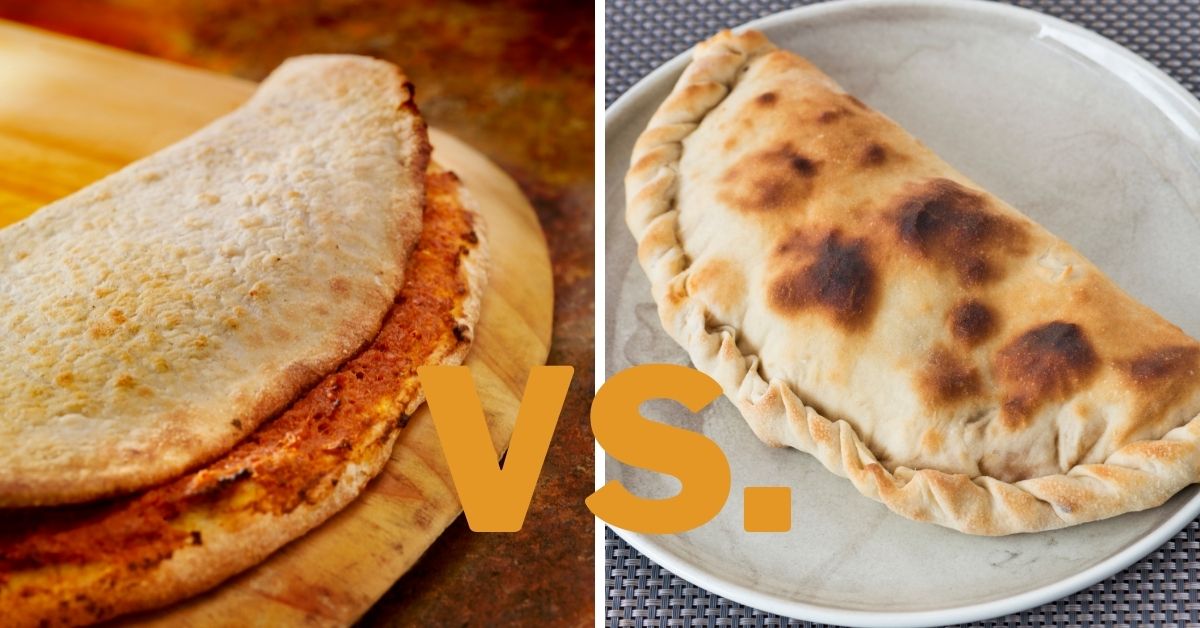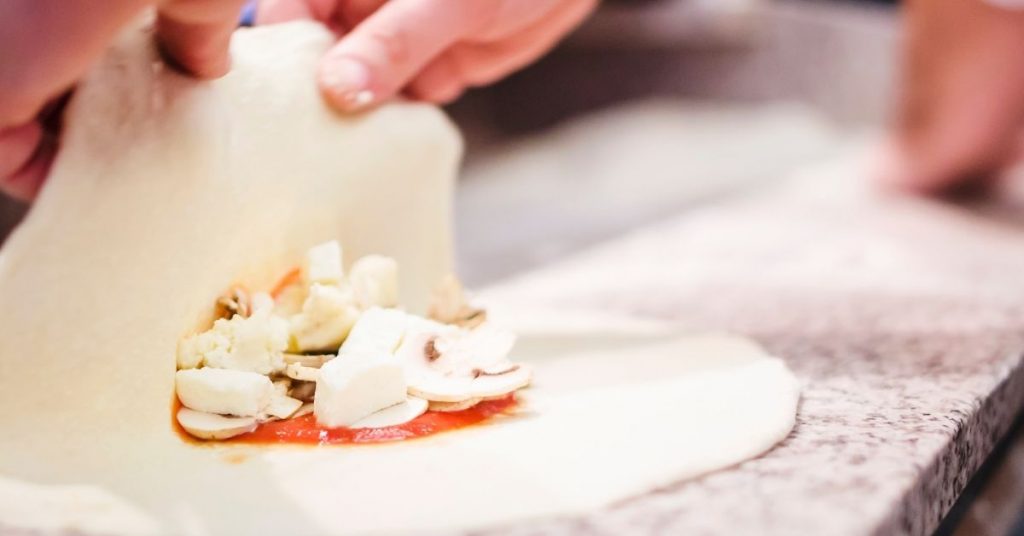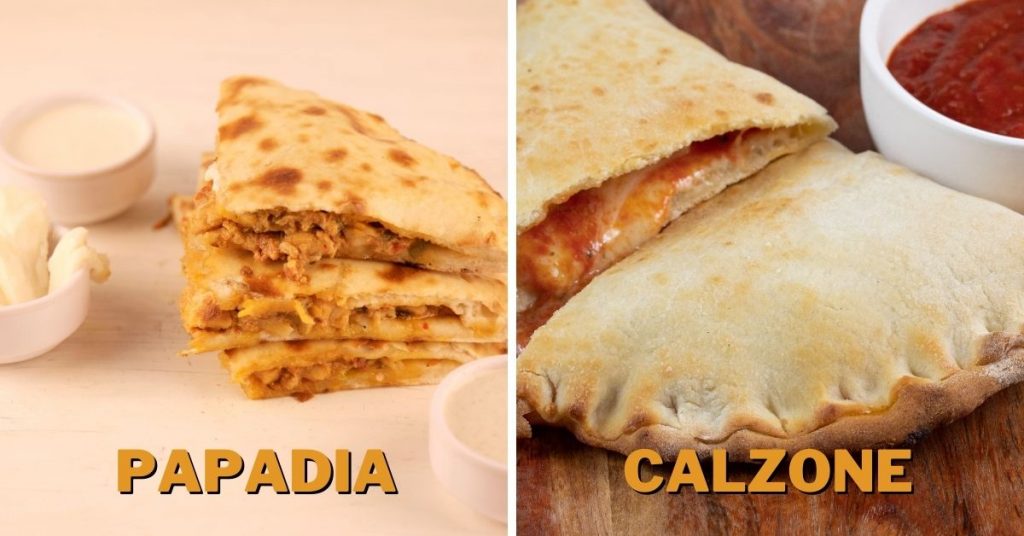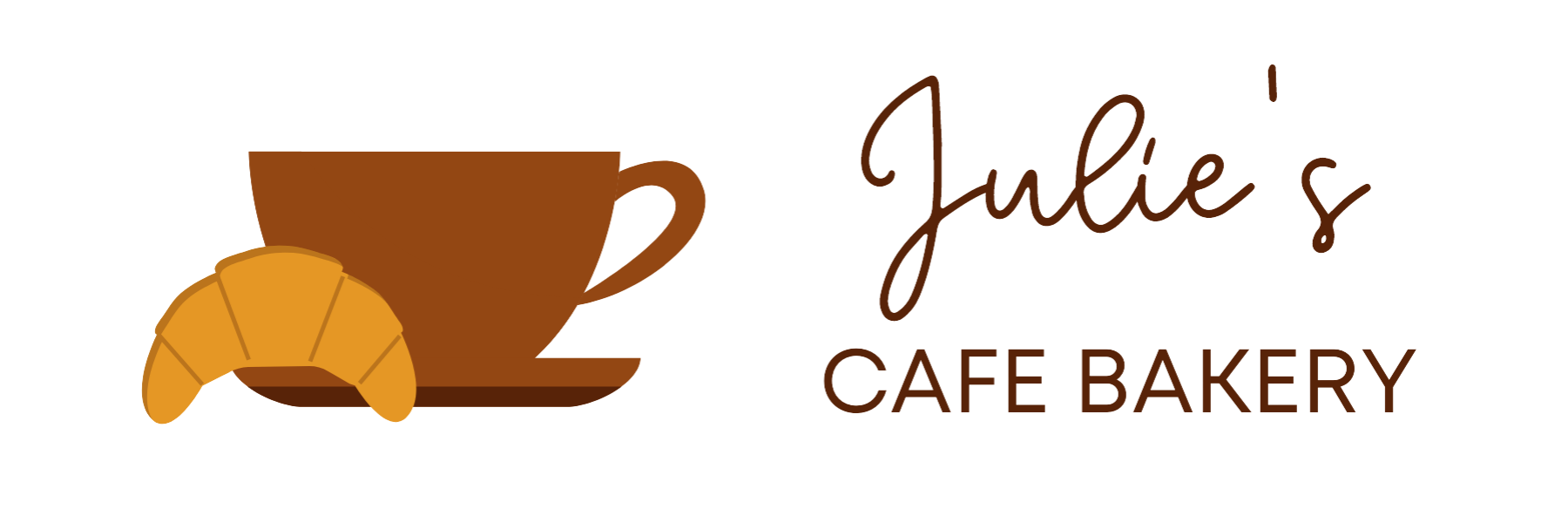Papadia Vs. Calzone: Differences & Which Is Better?


Papadia and Calzone are often mistaken one for the other as they contain many similar features, such as the taste of Italian pizza. However, there are some significant differences between them. Still, both are delicious snacks. So, what are the differences between papadia and Calzone?
Calzone is a filled hot pocket made of leavened bread dough, while papadia is a flatbread sandwich. The traditional calzone contains mozzarella, pecorino, or parmesan, with salami, or ham, and an egg. Papadia is filled with Alfredo sauce, Italian sausage, salami, mozzarella, and banana peppers.
Since papadia and Calzone are very tasty and a true palate feast, it wouldn’t be fair not to know the critical aspects of their differences. Therefore, in the following text, I will explain the differences between these two in terms of filling, cooking, serving, popularity, and a few other points.
Papadia Vs. Calzone: Differences
In addition to the different filling, which is totally customizable, the most significant difference between papadia and Calzone is the dough. One is Italian flatbread; the other is leavened bread dough.
Here is your cheat sheet to know how to recognize papadia and calzone, and later on, I will discuss each difference in detail.
| Papadia | Calzone | |
|---|---|---|
| Taste | Traditionally strong and spicy | Traditionally milder than papadia, but still flavourful |
| Filling | Traditionally filled with Alfredo sauce, Italian sausage, salami, mozzarella, and banana peppers. | Traditionally filled with mozzarella, pecorino, or parmesan combined with salami or ham, or vegetables, and an egg. Highly customizable depending on where it is made. |
| Making | Made with Italian flatbread, folded and baked | Traditionally made with leavened bread dough, filled with stuffing, sealed, and baked. |
| Popularity | Popular worldwide, but mainly in Europe and the USA. | Popular worldwide, but mainly in Europe and the USA. |
| Appearance and size | Similar in size to Calzone, but triangle-shaped and more robust. | Similar in size to papadia with a lighter color and smoother surface. |
| Serving and side dishes | It is traditionally served with pepperoncini and a sauce of choice on the side. | It is traditionally served with tomato or marinara sauce. |
| Origin | 2019, USA, Papa John’s brand | 18th century- Apulia, Italy |
Preparation, Filling, and Dough
Papadia is made of Italian flatbread, and it is essentially a pizza-filling sandwich. Calzone is a hot pocket made of leavened bread dough, which is later filled with pizza filling containing ham or salami and mozzarella, pecorino, or parmesan, and an egg.
The papadia filling traditionally contains Alfredo sauce, Italian sausage, salami, mozzarella, and banana peppers. Both papadia and calzone fillings are very customizable, so you can find them in many variants.
For example, there’s a veggie version of Calzone and a barbeque version of papadia.
The cooking manner, however, is the same; they are both filled and later baked along with the filling.
While Calzone is flapped over and sealed, papadia is just folded. It doesn’t resemble a burrito, nor does it look like a calzone. Most often, it has a triangular shape, and many refer to it as a folded pizza.

Taste
Although they are both delicious and strong-tasting, papadia takes the cake for intensity. It is more pungent and intense than a calzone, mainly due to the sausage it contains in the filling as well as the banana pepper, added specifically with that purpose.
Another contributing factor to its intense taste is the thin dough. The papadia’s dough is very thin and tender and has no mildening effect on the taste, as bread usually does.
On the other hand, Calzone is milder tasting than papadia but still very flavourful. The Calzone’s dough isn’t much thicker than the papadia’s, but it is more stable than bread dough. Also, the filling itself isn’t as intense as the papadia’s.
It is worth mentioning that, here, I’m talking about the traditional calzone and papadia fillings. These two pastries are very adjustable to the consumer’s needs, so don’t be surprised if you stumble upon a spicy calzone and a mild papadia.
Appearance and Size
While Calzone has a moon shape, papadia has a triangular shape. Their sizes are pretty similar, and some calzones can be bigger than some papadias and vice versa.
Calzone is a filled and sealed hot pocket and, therefore, it is a visible sealed ridge on the outer edges. On the other hand, papadia is most closely described as a folded pizza. It isn’t rolled, nor is it a filled pocket.
It looks much like a folded triangle-shaped crepe, while Calzone is a moon-shaped, semi-circular pastry.
Also, papadia is rougher on the palate than Calzone. Because the papadia’s dough is somewhat thinner, it becomes more crispy, additionally intensifying the taste. Calzone is softer and easier to chew, as there’s empty space inside, which fills with moisture, making the filling more moderate in intensity.

Variations
Papadia and Calzone come in many variations, and essentially their filling depends on the demand, so whatever you choose to fill them with goes.
Maybe you have heard of panzerotti which is the small version of calzone, fried in deep oil. Another similar dish to calzone is empanada, but it comes from Spain and it is made of a different kind of dough.
Papadia has for main versions: Italian, BBQ Chicken & Bacon, Philly Cheesesteak, and Meatball & Pepperoni. However, there’s no reason not to experiment with other flavors.
In addition to the traditional fillings, they come in vegetarian versions (although papadia’s vegetarian version still hasn’t been launched), whereby the cheese is substituted for tofu, and the meat is replaced either with soy or mushrooms. The filling options are virtually endless, as long as you observe the making method.
Popularity and Origin
You will be surprised to find out how new papadia is. It was created in 2019 by the Papa Jones brand. It is inspired by the piadina- an Italian folded flatbread sandwich from Northern Italy. It is a fusion between piadina and pizza.
Calzone is another story. Its origin dates way back to the 18th century in Apulia- Italy. It is a very popular dish in the USA and is considered domesticated in the USA culinary culture.
Papadia and Calzone are both very popular in the USA, especially Calzone. Also, there are many calzone and papadia variations domesticated in various cultures, they may not be called the same, but the making is definitely the one we discussed above.
Serving and Side Dishes
Although you can comfortably have papadia or Calzone on the go, they are intended to have in a restaurant setting.
Calzone is served with marinara sauce on the side, while papadia is served with pepperoncini and a sauce of choice on the side.
Both Calzone and papadia go with various sides, such as a fresh green salad, roasted vegetables such as zucchini, or an eggplant. They also go great with olives or mozzarella sticks or any of the ingredients already contained in the filling.
Nutrition
Calzone and papadia come with quite a few carbs and fat as tasty as they are. They contain protein from the meaty and cheesy filling and additional nutrients from the rest of the filling ingredients. [1]
They are pretty fatty, especially papadia, and high in calories.
Papadia Vs. Calzone: Which Is Better?
As similar as they may seem, papadia and Calzone are two separate pastries, and therefore they are incomparable. Both are very delicious and satisfying.
Nutrition-wise, they are pretty similar, and depending on what you want, they can both do a great job. To say that one is better would be insulting for either papadia or Calzone.
What Does Papadia Mean?
The word “papadia” derives from the Latin language, and it means “Father of the Pope.”
What Does Calzone Mean?
The word “calzone” means “trouser” or “stocking.”
